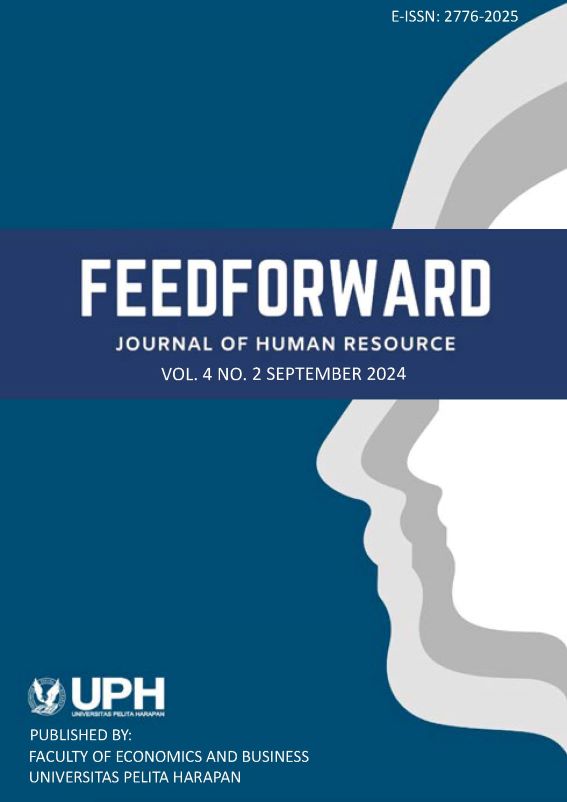LEADING LEARNING IN THE 21ST CENTURY: CHALLENGES AND STRATEGIES
DOI:
https://doi.org/10.19166/ff.v4i2.8736Schlagworte:
Educational Leadership, Challenges, StrategyAbstract
This study aims to find out the challenges faced by educational leaders in learning in the 21st century and explore various effective strategies to overcome them. Rapid technological advances, diverse student populations, and evolving educational paradigms, educational leaders face various challenges in improving learning outcomes. The method used is through a comprehensive review of relevant literature and empirical studies. The results of the study indicate that various strategies are needed for effective leadership in the 21st century, including visionary leadership, collaborative approaches, innovative pedagogy, and continuous professional development. Successful leadership initiatives and have a positive impact on learning outcomes in the context of modern education. Ultimately, this article contributes to the ongoing discourse on educational leadership and provides insights and recommendations for educational leaders, policymakers, and practitioners to navigate the complexities of leading learning in the 21st century.
Literaturhinweise
Alazmi, A. A., & Alazmi, H. S. (2023). Closing the gap between research and policy- making to better enable effective educational practice: A proposed framework. Education Research Policy and Practice, 22(3), 91-116. https://doi.org/10.1007/s10671-022-09321-4
Barrot, J., & Fernando, A. R. R. (2023). Unpacking engineering students’ challenges and strategies in a fully online learning space: The mediating role of teachers. Education and Information Technologies, 28(2), 9803-9825. http://dx.doi.org/10.1007/s10639-023-11598-8
Bloetner, S. (2023). The impact of collaborative leadership and empowerment on school district innovation and student achievement. CREATE Solutions, LLC. https://www.linkedin.com/pulse/impact-collaborative-leadership-empowerment-school-student-bloetner
Carvalho, M., Cabral, I., Verdasca, J. L., & Alves, J. M. (2021). Strategy and strategic leadership in education: A scoping review. Frontiers in Education, 6, 1-10. https://doi.org/10.3389/feduc.2021.706608
Ferlazzo, L. (2021, April 21). 10 Strategies for Building a Professional Learning Community. Education Week. https://www.edweek.org/leadership/opinion-10-strategies-for-building-a-professional-learning-community/2021/04
Herodotou, C., Sharples, M., Gaved, M., Kukulska-Hulme, A., Rienties, B., Scanlon, E., & Whitelock, D. (2019). Innovative pedagogies of the future: An evidence-based selection. Frontiers in Education, 4, 1-10. https://doi.org/10.3389/feduc.2019.00113
Li, Q., Baker, R., & Warschauer, M. (2020). Using clickstream data to measure, understand, and support self-regulated learning in online courses. The Internet and Higher Education, 45, 100-727. https://doi.org/10.1016/j.iheduc.2020.100727
Lübke, L., Pinquart, M., & Schwinger, M. (2021). The role of flexibility in the realization of inclusive education. Sustainability, 13(8), 1-18. https://doi.org/10.3390/su13084452
Najarro, I. (2024, March 06). The Lily Gladstone effect: A teacher explains the value of indigenous language immersion. Education Week. https://www.edweek.org/leadership/the-lily-gladstone-effect-a-teacher-explains-the-value-of-indigenous-language-immersion/2024/03
Nyamkhuu, T., & Morohashi, J. (2019, February 5). Challenges in integrating 21st century skills into education systems. Brookings. https://www.brookings.edu/articles/challenges-in-integrating-21st-century-skills-into-education-system/
OECD. (2021). Education at a glance 2021: OECD indicators. OECD Publishing. https://doi.org/10.1787/b35a14e5-en
Onyishi, N. C., & Sefotho, M. M. (2020). Teachers’ perspectives on the use of differentiated instruction in inclusive classrooms: Implications for teacher education. International Journal of Higher Education, 9(6), 136-150. https://doi.org/10.5430/ijhe.v9n6p136
Singha, R., & Singha, S. (2024). Application of experiential, inquiry-based, problem- based, and project-based learning in sustainable education. In C. L. Goi (Ed.), Teaching and learning for a sustainable future: Innovative strategies and best practices (pp. 109-128). IGI Global. http://dx.doi.org/10.4018/978-1-6684-9859-0.ch006
Slade, S., & Gallagher, A. (2021, October 28). Transformational vs. instructional leadership. Which is better? Education Week. https://www.edweek.org/leadership/opinion-transformational-vs-instructional-leadership-which-is-better/2021/10
Sumeracki, M. (2024). Six strategies for effective learning: A summary for teachers ”” The learning scientists. The Learning Scientists. https://www.learningscientists.org/blog/2019/11/28-1
Valdez, A. S., Raza, T., Farolan, M. I., Mendoza, C. I., Perez, L. Q., Peralta, J. F., Valencia, R. I., & Lim, H. A. M. P. (2023). Primary and secondary data collection to conduct researches, write thesis and dissertation amidst COVID-19 pandemic: A guidepost. In Proceedings of the 2nd International Symposium on Disaster Resilience and Sustainable Development, 2, 269-288. https://doi.org/10.1007/978-981-19-6297-4_20.
Zhu, M., Berri, S., Koda, R., & Wu, Y. J. (2024). Exploring students’ self-directed learning strategies and satisfaction in online learning. Education and Information Technologies, 29, 2787-2803. https://doi.org/10.1007/s10639-023-11914-2
Downloads
Veröffentlicht
Ausgabe
Rubrik
Lizenz
Authors who publish with this journal agree to the following terms:
1) Authors retain copyright and grant the journal right of first publication with the work simultaneously licensed under a Creative Commons Attribution License (CC-BY-SA 4.0) that allows others to share the work with an acknowledgement of the work's authorship and initial publication in this journal.
2) Authors are able to enter into separate, additional contractual arrangements for the non-exclusive distribution of the journal's published version of the work (e.g., post it to an institutional repository or publish it in a book), with an acknowledgement of its initial publication in this journal.
3) Authors are permitted and encouraged to post their work online (e.g., in institutional repositories or on their website). The final published PDF should be used and bibliographic details that credit the publication in this journal should be included.


